Related Research Articles

Duke of Wellington is a title in the Peerage of the United Kingdom. The name derived from Wellington in Somerset. The title was created in 1814 for Arthur Wellesley, 1st Marquess of Wellington, the Anglo-Irish military commander who is best known for leading the decisive victory with Field Marshal von Blücher over Napoleon's forces at Waterloo in Brabant. Wellesley later served twice as British prime minister.
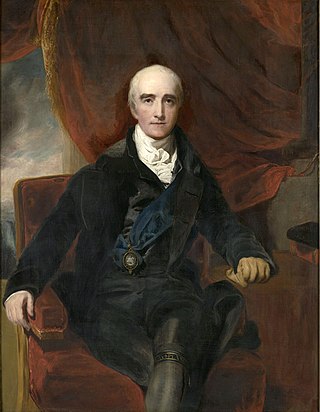
Richard Colley Wellesley, 1st Marquess Wellesley, was an Anglo-Irish politician and colonial administrator. He was styled as Viscount Wellesley until 1781, when he succeeded his father as 2nd Earl of Mornington. In 1799, he was granted the Irish peerage title of Marquess Wellesley. He was also Lord Wellesley in the Peerage of Great Britain.
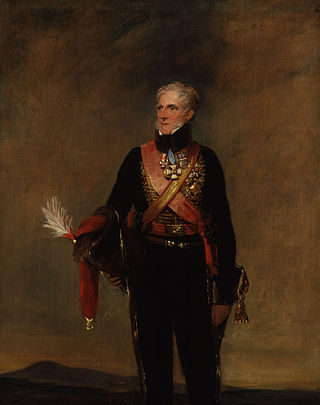
Henry William Paget, 1st Marquess of Anglesey, styled Lord Paget between 1784 and 1812 and known as the Earl of Uxbridge between 1812 and 1815, was a British Army officer and politician. After serving as a member of parliament for Carnarvon and then for Milborne Port, he took part in the Flanders Campaign and then commanded the cavalry for Sir John Moore's army in Spain during the Peninsular War; his cavalry showed distinct superiority over their French counterparts at the Battle of Sahagún and at the Battle of Benavente, where he defeated the elite chasseurs of the French Imperial Guard. During the Hundred Days he led the charge of the heavy cavalry against Comte d'Erlon's column at the Battle of Waterloo. At the end of the battle, he lost part of one leg to a cannonball. In later life he served twice as Master-General of the Ordnance and twice as Lord Lieutenant of Ireland.

Martin Lister was an English naturalist and physician. His daughters Anne and Susanna were two of his illustrators and engravers.
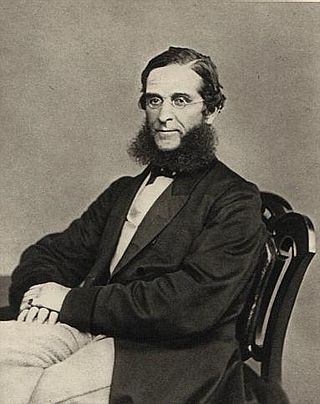
Sir John Evans was an English archaeologist and geologist.
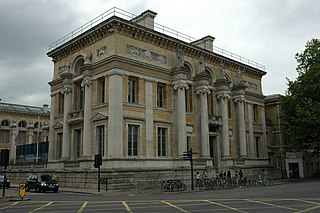
The Taylor Institution is the Oxford University library dedicated to the study of the languages of Europe. Its building also includes lecture rooms used by the Faculty of Medieval and Modern Languages, University of Oxford. Since 1889, an Annual Lecture on a subject of Foreign Literature has been given at the Taylorian Institution.

Francis Douce was a British antiquary and museum curator.
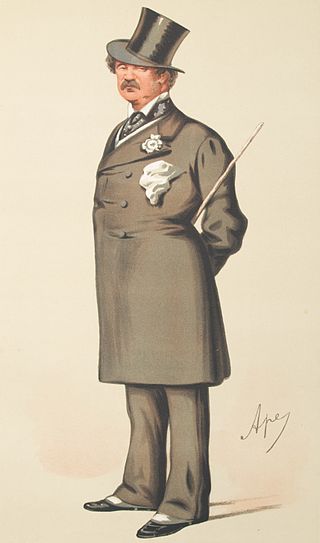
Lord Alfred Henry Paget was a British soldier, courtier and Liberal politician who sat in the House of Commons between 1837 and 1865.

Windlesham House School is an independent boarding and day school for boys and girls aged 4 to 13 on the South Downs, in Pulborough, West Sussex, England. It was founded in 1837 by Charles Robert Malden and was the first boys' preparatory school in the United Kingdom. In 1967 it became the first IAPS co-educational school. The school moved to its current location in 1934. It caters for over 300 pupils. Children aged 4 to 7 are taught in the pre-prep.

Broad Street is a wide street in central Oxford, England, just north of the former city wall. The street is known for its bookshops, including the original Blackwell's bookshop at number 50, located here due to the University of Oxford. Among residents, the street is traditionally known as The Broad.
Charles William Frederick Cavendish-Bentinck was a clergyman of the Church of England who held livings in Bedfordshire. He was also the maternal grandfather of Queen Elizabeth The Queen Mother and a great-great-grandfather of King Charles III.

Lady Charles Cavendish-Bentinck, known between 1806 and 1816 as Lady Abdy, was a British aristocrat and a great-great-grandmother of Queen Elizabeth II.

Alexander Munro was a British sculptor of the Pre-Raphaelite movement. He concentrated on portraiture and statues, but is best known for his Rossetti-influenced figure-group Paolo and Francesca (1852), which has often been identified as the epitome of Pre-Raphaelite sculpture.

Charles Buller Heberden was an English classical scholar and academic administrator. He was principal of Brasenose College, Oxford (1889–1920) and served as Vice-Chancellor of Oxford University.

John Arthur Ruskin Munro (1864–1944) was the Rector of Lincoln College, Oxford.
Richard Wellesley was an Anglo-Irish Member of Parliament.
Richard Shute was a British classicist and logician.
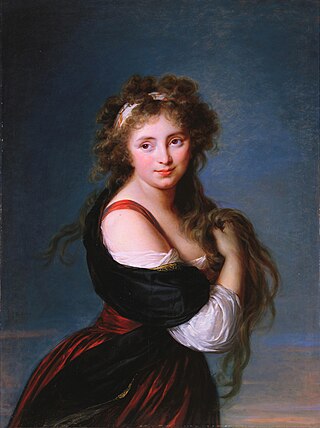
Hyacinthe-Gabrielle Wellesley, Countess of Mornington was a French actress who became the mistress, and later the wife, of Richard Wellesley, 1st Marquess Wellesley. As an actress, she was known as Gabrielle Fagan. Through her daughter, Anne, Roland was a great-great-great grandmother of Queen Elizabeth II.

Alexander Macdonald (1849–1921), sometimes erroneously written MacDonald, was a British artist and art educator.
Percy Manning (1870–1917) was a British antiquary, folklorist, and archaeologist, with a special interest in Oxfordshire.
References
- ↑ "Dr Rev Henry Wellesley (Biographical details)". British Museum . Retrieved 25 May 2018.
Son of Marquess Richard Wellesley (q.v.) a\nd Hyacinth Roland (q.v). Principal of New Inn Hall, Oxford, curator of the Bodleian Library, curator of Ashmolean Museum and Taylor Institute.
- 1 2 Alfred Webb (1878). "A Compendium of Irish Biography: Comprising Sketches of Distinguished Irishmen, and of Eminent Persons Connected with Ireland by Office Or by Their Writings". M.H. Gill & son . Retrieved 25 May 2018.
The Marquis left no legitimate children. His son Henry Wellesley, D.D. (born 1792; died 1866), Principal of New Inn Hall, Oxford, the author of several works, was a man of the most cultivated tastes; his knowledge of Spanish and Italian art and literature 'was supreme'.
- ↑ Foster, Joseph (1888–1892). . Alumni Oxonienses: the Members of the University of Oxford, 1715–1886 . Oxford: Parker and Co – via Wikisource.
- ↑ John McClintock; James Strong (1891). Cyclopædia of Biblical, Theological, and Ecclesiastical Literature, Volume 12. Harper & Brothers. p. 902. Retrieved 25 May 2018.
He was the author of Anthologica Polyglotta; or, A Selection of Versions in Various Languages, Chiefly from the Greek Anthology (1849);--and Stray Notes of Shakespeare (1865).